At Experion Technologies, we combine deep healthcare domain knowledge with cutting-edge engineering expertise to design healthcare analytics software that empowers organizations to harness the full value of their data. Our solutions are built to enhance patient care, improve operational efficiency, and ensure regulatory compliance while enabling healthcare providers to remain agile in a rapidly changing industry.
Modern healthcare is undergoing a profound transformation, with data at the heart of this evolution. Every patient interaction, diagnostic test, clinical procedure, and administrative process generates valuable data. When analyzed effectively, this data becomes a powerful tool that guides better decision-making, enhances patient engagement, and streamlines operations. The increasing reliance on healthcare data analytics software highlights its critical role in shaping the future of care delivery and public health management.
What is Healthcare Analytics Software?
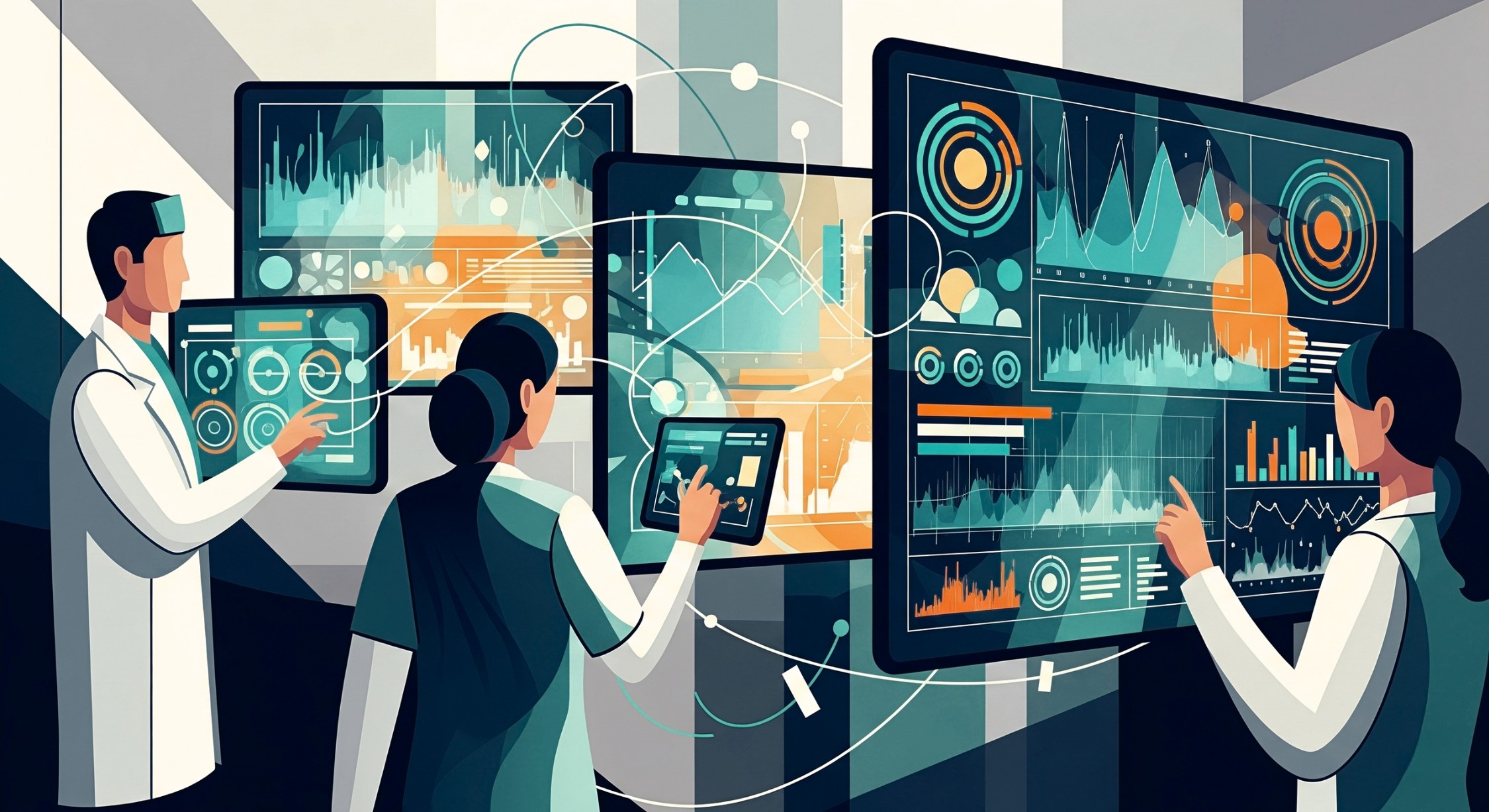
Healthcare analytics software is a sophisticated solution designed to help healthcare organizations capture, organize, and analyze data across clinical, operational, and financial domains. Instead of simply storing information, these platforms translate raw, unstructured data into meaningful insights that can be acted upon immediately. This empowers clinicians to deliver personalized care, administrators to optimize hospital operations, and policymakers to make informed decisions that benefit entire populations.
The ultimate purpose of healthcare analytics software is to bridge the gap between vast amounts of data and actionable intelligence. By transforming complex datasets into clear insights, healthcare providers can reduce costs, predict patient risks, improve care quality, and build a more responsive and resilient healthcare system.
Better care starts with better data. Ready to take the first step?
Core Functionalities
Healthcare analytics software is designed with a range of powerful capabilities that enable healthcare providers and institutions to unlock the full potential of their data.
- Data Integration: One of the most critical aspects of any healthcare data analytics software is its ability to unify information from diverse sources. This includes Electronic Health Records (EHRs), medical devices, laboratory systems, imaging tools, and administrative platforms. By integrating these fragmented data points into a single environment, organizations gain a holistic view of patient health, operational performance, and financial metrics.
- Visualization: Data in healthcare is often complex and overwhelming. Visualization capabilities transform these datasets into intuitive dashboards, charts, and interactive reports. Clinicians can quickly identify patient trends, administrators can track workflow efficiency, and policymakers can visualize the impact of decisions at the population level.
- Decision Support: Perhaps the most impactful functionality of healthcare analytics software is its role in decision support. Through predictive modeling and advanced algorithms, it enables clinicians, administrators, and policymakers to make evidence-based choices. With the growing adoption of healthcare predictive analytics software, providers can anticipate patient risks, forecast demand, and intervene before adverse outcomes occur.
Examples of Use
The application of data analytics software for healthcare extends across multiple segments of the ecosystem:
- Hospitals: Healthcare analytics is used to predict patient readmissions, optimize staff schedules, and ensure efficient allocation of critical resources such as ICU beds and medical equipment. These insights not only improve patient outcomes but also reduce operational strain.
- Research Institutions: Clinical research generates enormous datasets, from trial results to genomic studies. By leveraging custom healthcare analytics software, researchers can analyze complex datasets more efficiently, accelerate drug development, and identify new treatment pathways.
- Public Health Systems: Governments and public health organizations rely on healthcare data analytics software to track infectious diseases, monitor population health, and design targeted interventions. This enables faster responses to outbreaks, smarter vaccination strategies, and more effective allocation of public health resources.
Why Healthcare Needs Strong Analytics Capabilities?
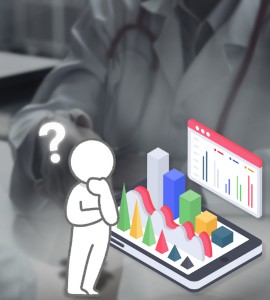 Healthcare today is defined by data, but without the right tools, much of this data remains underutilized. Without data analytics software for healthcare, organizations face fragmented datasets, regulatory compliance challenges, and slow decision-making processes.
Healthcare today is defined by data, but without the right tools, much of this data remains underutilized. Without data analytics software for healthcare, organizations face fragmented datasets, regulatory compliance challenges, and slow decision-making processes.
Healthcare generates vast amounts of complex data from patient encounters, diagnostics, insurance claims, and administrative records. Traditional systems can store this information, but they lack the intelligence to transform it into actionable insights. Healthcare analytics software solves this problem by processing diverse datasets in real time and offering timely, accurate, and actionable intelligence.
The demand for healthcare predictive analytics software has grown because organizations need to move beyond descriptive reporting into proactive planning. By predicting patient risks, forecasting disease patterns, and identifying operational bottlenecks, analytics platforms give healthcare providers the ability to respond swiftly and effectively.
At the same time, custom healthcare analytics software ensures that solutions align with the specific needs of an organization, whether it is a hospital, research institute, or public health system. Customization ensures scalability, compliance with regulations such as HIPAA and GDPR, and seamless integration with existing healthcare systems.
In a sector where the cost of inefficiency can be measured in human lives, the role of healthcare analytics software is no longer optional. It is a necessity for organizations that want to deliver better care, remain compliant, and thrive in a data-driven future.
Difference Between Traditional Systems and Analytics Platforms
Traditional healthcare data systems were primarily designed to store information and maintain records. While they serve as valuable repositories, they often leave organizations struggling with fragmented datasets and limited visibility. These systems can capture what happened, but they rarely explain why it occurred or what might happen next.
In contrast, healthcare analytics software elevates the role of data by turning static information into actionable intelligence. Instead of merely archiving records, modern analytics platforms enable healthcare providers to uncover patterns, analyze trends, and respond proactively. For instance, with the help of healthcare predictive analytics software, hospitals can forecast patient readmissions, anticipate staffing needs, and predict disease outbreaks. This transition from storage to actionable insights is what makes data analytics software for healthcare essential in today’s dynamic environment.
Understanding Custom Healthcare Analytics Software
Every healthcare institution, whether a hospital, a research body, or a public health organization, operates with unique challenges and workflows. Off-the-shelf solutions may offer standard capabilities, but they often fall short in meeting these specific demands. That is where custom healthcare analytics software becomes critical.
A custom-built solution can be seamlessly integrated with existing Electronic Health Records (EHRs), laboratory information systems, medical devices, and administrative platforms. This ensures continuity in day-to-day workflows while unlocking the potential of advanced analytics. By tailoring the system, healthcare providers gain insights that are directly relevant to their unique goals, whether improving clinical outcomes, reducing operational inefficiencies, or enhancing compliance.
Benefits of Customization
- Flexibility: Custom healthcare analytics software allows organizations to adapt solutions to specific clinical or administrative objectives. For example, a cancer research institute may need specialized dashboards for genomic data, while a hospital may prioritize bed utilization analytics.
- Scalability: As patient populations grow and data sources expand, a tailored system ensures smooth scalability. Unlike rigid traditional systems, healthcare data analytics software can grow alongside the institution, handling increasing volumes of information without compromising performance.
- Compliance Alignment: Regulatory compliance is a cornerstone of healthcare. With customization, systems can be aligned with HIPAA, GDPR, and other region-specific requirements, ensuring that sensitive patient information is always protected.
Stop reacting. Start predicting.
Transform healthcare with Experion’s analytics solutions
Importance of Healthcare Analytics in Today’s Ecosystem
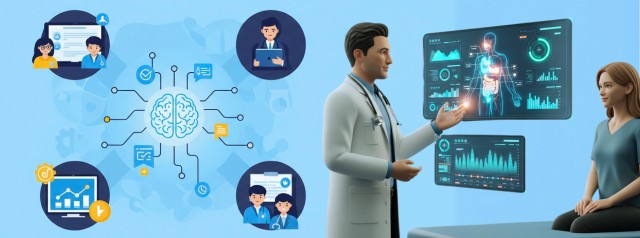
The healthcare industry today cannot thrive without robust analytics capabilities. The value of healthcare analytics software lies in its ability to deliver real-time, actionable insights that transform both clinical care and operational efficiency.
- Improving patient care and safety: By continuously monitoring patient data, healthcare predictive analytics software can alert clinicians to potential complications before they escalate, enabling timely interventions.
- Reducing costs and inefficiencies: Data analytics software for healthcare helps administrators identify wasteful processes, optimize scheduling, and allocate resources more effectively, leading to significant cost savings.
- Supporting population health initiatives: Advanced healthcare data analytics software enables governments and organizations to track public health trends, manage chronic conditions across large populations, and design preventive health programs.
- Enhancing compliance and reporting: Automated analytics reduce the burden of manual reporting, improve accuracy, and ensure organizations meet regulatory requirements without delays.
In essence, healthcare analytics software has become the backbone of modern healthcare. By shifting from static data storage to dynamic intelligence, it empowers organizations to improve patient outcomes, enhance operational resilience, and build a more data-driven healthcare ecosystem.
Types of Healthcare Analytics
The power of healthcare analytics software lies in its ability to interpret data in different ways, depending on the goals of the organization. Broadly, analytics in healthcare can be categorized into four main types:
Descriptive Analytics
Descriptive analytics summarizes historical healthcare data to identify trends and recurring patterns. For example, a hospital might use healthcare data analytics software to review patient admissions over the past five years, gaining insights into seasonal fluctuations or disease prevalence. By understanding what has already happened, healthcare providers can make informed decisions about resource planning and policy-making.
Diagnostic Analytics
While descriptive analytics explains “what happened,” diagnostic analytics explores “why it happened.” By analyzing data relationships and drilling into root causes, organizations can uncover the drivers behind healthcare challenges. For instance, if a hospital experiences consistently high readmission rates, data analytics software for healthcare can identify contributing factors such as incomplete discharge instructions or poor follow-up care.
Predictive Analytics
Healthcare predictive analytics software takes the next step by forecasting what is likely to happen in the future. Using statistical modeling, machine learning, and AI, predictive analytics helps healthcare organizations anticipate patient risks, disease outbreaks, and demand surges. A real-world example is predicting which patients are at higher risk for complications, enabling doctors to intervene earlier and improve outcomes.
Prescriptive Analytics
Prescriptive analytics provides recommendations for the best course of action based on available data. With the help of custom healthcare analytics software, clinicians can receive guidance on treatment plans tailored to individual patient needs, while administrators can gain insights into optimizing staffing levels and reducing costs. This type of analytics is particularly valuable because it turns data into direct, actionable steps.
Together, these four types of analytics create a powerful ecosystem that empowers healthcare providers to move from hindsight to foresight, ensuring more efficient and proactive care delivery.
Key Features and Capabilities to Look for in Healthcare Analytics Software
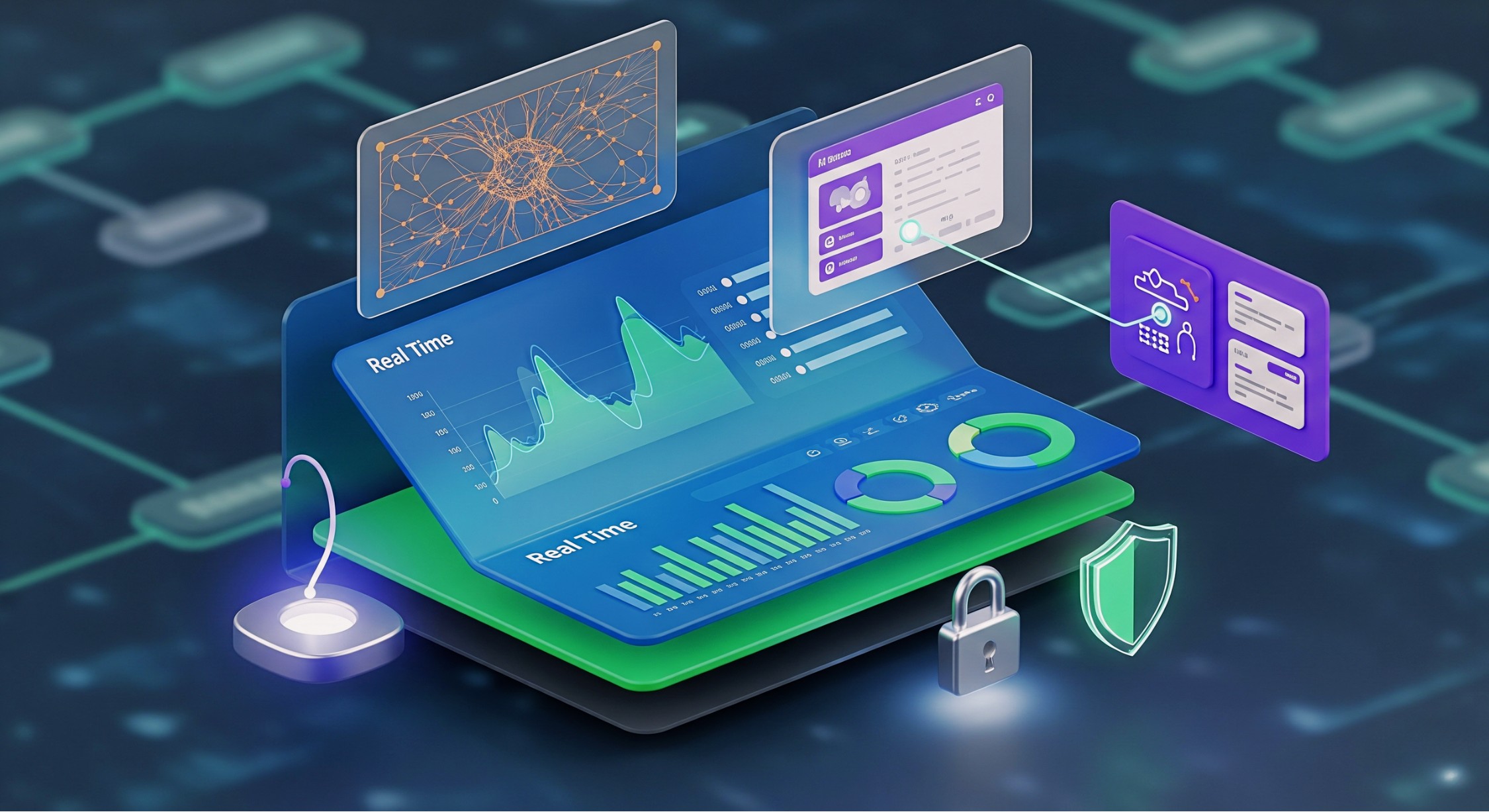
When choosing the right healthcare analytics software, organizations must look beyond basic reporting and consider features that enable advanced, secure, and real-time decision-making. The following capabilities are essential:
- Real-time Data Analysis: The ability to process and deliver insights instantly is critical in healthcare, where timely interventions can save lives.
- Intuitive Dashboards and Visualization: Complex datasets are transformed into easy-to-understand dashboards, empowering clinicians and administrators to make quick, informed decisions.
- Predictive Modeling and Forecasting: With healthcare predictive analytics software, organizations can anticipate patient admissions, identify risk factors, and manage future demands with greater accuracy.
- Seamless Integration with EHRs and External Systems: Interoperability ensures that custom healthcare analytics software works effortlessly with existing electronic health records, medical devices, and third-party platforms.
- Security and Compliance Features: Robust data protection is vital in healthcare. Modern healthcare data analytics software includes advanced security controls to comply with HIPAA, GDPR, and other regional standards, safeguarding sensitive patient information.
At Experion, we design and implement data analytics software for healthcare that is not only powerful but also secure, interoperable, and future-ready. By combining deep domain expertise with advanced technology, we ensure our solutions evolve alongside healthcare organizations and their growing data needs.
Every dataset hides a breakthrough.
Partner with Experion to find it
Steps to Implement Healthcare Analytics Software Successfully
Implementing healthcare analytics software is not simply a technology upgrade. It is a strategic initiative that requires careful planning and alignment with organizational goals. A successful implementation follows a structured approach:
- Assess Organizational Needs
Begin by clearly defining the clinical, operational, and financial objectives you want to achieve. Hospitals may focus on reducing readmission rates, research institutions may prioritize analyzing trial data, while public health systems may aim to track disease outbreaks. This step ensures the selected data analytics software for healthcare is aligned with measurable outcomes. - Choose the Right Solution Type
Organizations often face a choice between off-the-shelf platforms and custom healthcare analytics software. While off-the-shelf solutions provide quick deployment, custom-built platforms are tailored to specific workflows, compliance needs, and integration requirements. Choosing wisely at this stage determines long-term scalability and adaptability. - Plan for Seamless Integration
Legacy systems such as EHRs, lab systems, and medical devices already house massive volumes of data. Effective implementation requires a roadmap for integrating these systems with the new healthcare data analytics software, ensuring smooth migration, interoperability, and minimal disruption to daily workflows. - Train Staff and Encourage Adoption
Even the most advanced healthcare analytics software is only as effective as the people who use it. Hands-on training, change management initiatives, and continuous support help clinicians, administrators, and researchers embrace the platform. Empowering staff with confidence in the system fosters adoption across the organization. - Monitor, Measure, and Optimize
Successful analytics implementation is an ongoing journey. Once the system is live, organizations must continuously monitor performance, measure outcomes, and refine processes. With healthcare predictive analytics software, improvements can be identified in real time, allowing organizations to evolve and adapt to new challenges.
Benefits of Data Analytics Software for Healthcare
The adoption of data analytics software for healthcare delivers transformative benefits across clinical, operational, and strategic levels:
- Personalized Treatment Plans for Patients
By analyzing patient histories, lab results, and risk profiles, healthcare data analytics software helps clinicians design personalized treatment plans. Predictive models enhance patient safety by anticipating complications before they arise. - Optimized Staff and Resource Scheduling
Hospitals can use healthcare predictive analytics software to forecast patient inflow, enabling smarter allocation of staff, beds, and equipment. This improves efficiency while ensuring high-quality care delivery. - Reduced Medical Errors Through Data-Driven Decision Support
Errors in healthcare often stem from fragmented or incomplete information. Healthcare analytics software minimizes these risks by offering real-time, evidence-based insights that guide clinical decisions and reduce preventable errors. - Evidence-Based Policy and Operational Improvements
Public health organizations and policymakers benefit from custom healthcare analytics software that aggregates and analyzes data on population health trends. This supports more informed decision-making, enabling better preventive measures, targeted interventions, and streamlined operations.
In today’s data-driven healthcare landscape, the ability to extract meaningful insights from vast datasets is not just an advantage, it is essential for improving patient care, reducing costs, and ensuring compliance.
Challenges in Adopting Healthcare Analytics
While the benefits of healthcare analytics software are transformative, many organizations encounter challenges during adoption. These hurdles need to be addressed strategically to realize the full potential of analytics.
- Data Silos and Lack of Interoperability
Healthcare data often resides in multiple disconnected systems such as EHRs, lab databases, and billing software. Without proper integration, insights remain fragmented. Custom healthcare analytics software plays a crucial role here, as it can unify disparate data sources into a single platform, creating a holistic view of patient care and operations. - Ensuring Data Privacy and Security
Healthcare data is among the most sensitive information in any industry. Organizations must comply with HIPAA, GDPR, and regional privacy laws to protect patient records. Healthcare data analytics software must therefore come equipped with robust encryption, access controls, and audit trails to maintain trust and compliance. - High Infrastructure Costs
Deploying data analytics software for healthcare often requires investment in infrastructure, cloud platforms, and advanced computing power. Smaller organizations may find this prohibitive. However, scalable cloud-based solutions and modular custom healthcare analytics software are emerging to address cost challenges, allowing organizations to adopt analytics without overwhelming budgets. - Cultural Resistance from Staff
Introducing advanced healthcare predictive analytics software into daily operations can face resistance from clinicians and administrators who are accustomed to traditional methods. Comprehensive training programs, user-friendly dashboards, and phased rollouts are essential to foster acceptance and encourage adoption across teams.
Real-World Applications
The true value of healthcare analytics software is realized when data-driven insights are applied to real-world challenges. Notable impactful use cases include:
- Predicting Patient Readmissions and Preventing Complications
Hospitals leverage healthcare predictive analytics software to identify patients at risk of readmission. By flagging high-risk cases early, healthcare providers can design targeted follow-up care and interventions, ultimately improving outcomes and reducing costs. - Managing Chronic Diseases More Effectively
Chronic conditions such as diabetes, heart disease, and asthma require ongoing monitoring. Healthcare data analytics software enables clinicians to track patient progress over time, personalize treatment plans, and detect early warning signs that may require intervention. - Improving Insurance Claims Processing
Custom healthcare analytics software can streamline claims processing by detecting patterns of fraud, identifying inefficiencies, and automating verification processes. This reduces administrative overhead while speeding up reimbursements. - Streamlining Hospital Workflows
From bed management to staff scheduling, data analytics software for healthcare helps hospitals run more efficiently. By analyzing operational patterns, administrators can optimize workflows, reduce wait times, and allocate resources more effectively.
Your data knows the future of care.
Ready to unlock it with Experion?
Future Trends in Healthcare Analytics
 The landscape of healthcare analytics is evolving rapidly. Several emerging trends are shaping the future of how data is collected, processed, and applied in patient care.
The landscape of healthcare analytics is evolving rapidly. Several emerging trends are shaping the future of how data is collected, processed, and applied in patient care.
AI and Machine Learning
Artificial intelligence is expanding the power of healthcare predictive analytics software. By processing vast datasets at unprecedented speed, AI models can identify subtle patterns in patient health, predict disease outbreaks, and recommend highly personalized treatment strategies.
IoT-Enabled Real-Time Analytics
With the proliferation of connected medical devices, the Internet of Things (IoT) is revolutionizing care delivery. Wearable devices, remote monitoring tools, and smart medical equipment continuously feed patient data into healthcare analytics software. Real-time analysis of this information allows for proactive care and early interventions.
Blockchain for Secure Data Exchange
Data integrity and security remain top concerns. Blockchain technology offers a decentralized, tamper-proof way to exchange healthcare data across organizations. When integrated with custom healthcare analytics software, blockchain ensures trust, transparency, and security in patient data sharing.
Wearables and Patient-Generated Data
Patients are becoming active participants in their healthcare journeys through wearables and health apps. From tracking heart rates to monitoring sleep cycles, this data can be analyzed with healthcare data analytics software to offer deeper insights into lifestyle patterns, preventive care opportunities, and personalized treatment plans.
How Experion Helps in Developing Robust Healthcare Analytics Software?
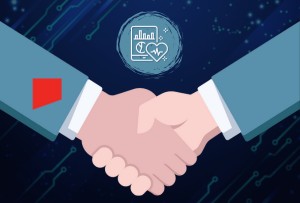 At Experion, we specialize in building custom healthcare analytics software that merges cutting-edge technology with deep healthcare expertise. Our solutions are designed to align with clinical, operational, and regulatory needs, helping organizations gain actionable insights from their data.
At Experion, we specialize in building custom healthcare analytics software that merges cutting-edge technology with deep healthcare expertise. Our solutions are designed to align with clinical, operational, and regulatory needs, helping organizations gain actionable insights from their data.
One example of this is our work in mobile health application development for a global healthcare organization. Experion partnered with the client to build a digital health platform that not only supported remote care delivery but also enabled advanced analytics. The solution integrated patient-reported data, wearable device inputs, and clinical records to generate real-time insights. This empowered providers to track patient progress, predict potential risks, and deliver more personalized care, all while ensuring compliance with healthcare data privacy regulations.
Our expertise extends across a wide range of healthcare analytics applications, including:
- Predicting Readmissions: Using healthcare predictive analytics software to proactively identify high-risk patients and reduce costly hospital readmissions.
- Tracking Infectious Diseases: Leveraging real-time analytics to monitor outbreaks and support rapid response strategies.
- Managing Chronic Conditions: Applying predictive insights to conditions like diabetes and hypertension, enabling better long-term management.
- Streamlining Insurance Claims: Automating workflows with healthcare data analytics software to minimize fraud, reduce delays, and improve processing efficiency.
- Optimizing Hospital Operations: Using data analytics software for healthcare to improve resource utilization, cut costs, and enhance overall operational efficiency.
By combining advanced analytics with a user-centered approach, Experion ensures that our healthcare solutions are secure, interoperable, and built for measurable impact.
Conclusion
In today’s complex healthcare ecosystem, healthcare analytics software is not an optional investment, it is the foundation of modern, data-driven care delivery. From predicting patient outcomes to optimizing operations and supporting compliance, analytics transforms every aspect of healthcare. Organizations that leverage custom healthcare analytics software are not only better equipped to handle current challenges but also prepared to embrace future opportunities in AI, IoT, and blockchain-enabled healthcare ecosystems.
Healthcare leaders must recognize that data is not just an asset but a catalyst for innovation, efficiency, and improved patient care. By adopting the right healthcare data analytics software, organizations can ensure they are building a future-ready, patient-centric healthcare system.
Key Takeaways
- Data-driven decision-making leads to improved patient outcomes and operational excellence.
- Custom healthcare analytics software ensures flexibility, scalability, and compliance alignment with HIPAA, GDPR, and other regulations.
- Healthcare predictive analytics software enables proactive care by forecasting risks and optimizing resource allocation.
- Data analytics software for healthcare improves efficiency across claims processing, clinical workflows, and population health initiatives.
- Future technologies like AI, IoT, blockchain, and wearables will redefine how healthcare data is captured, analyzed, and applied.
- Partnering with experts like Experion ensures robust, secure, and scalable analytics solutions tailored to organizational needs.
At Experion Technologies, we partner with healthcare providers to design and implement healthcare analytics solutions that deliver measurable business impact while elevating patient care.
Ready to harness the power of your healthcare data? Connect with Experion today and explore how we can build the right analytics solution for your organization.

